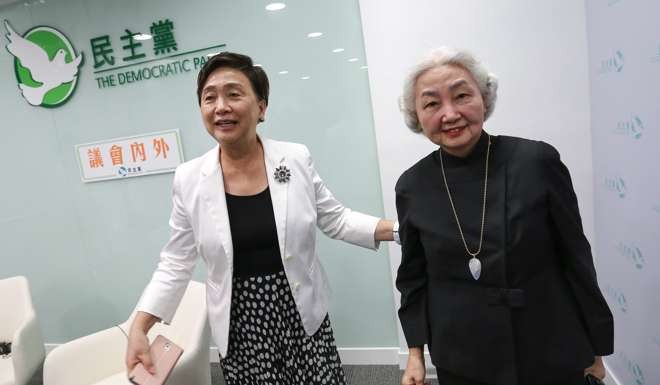
Hong Kong localist radicals played into Beijing’s hands, democracy leader Martin Lee says
Disrespectful oath-taking gave mainland officials a good excuse to rewrite the Basic Law, thereby ‘destroying’ city’s ‘one country, two systems’ formula

The antics of two localists during the Legislative Council swearing-in ceremony last month gave Beijing a good excuse to undermine the “one country, two systems” formula, a former Basic Law drafter said on Thursday.
Martin Lee Chu-ming SC, founding chairman of the Democratic Party, said he had suspicions about the actions of Youngspiration lawmakers-elect Sixtus Baggio Leung Chung-hang and Yau Wai-ching, who were disqualified by the High Court on Tuesday.
Speaking after a Commercial Radio programme, Lee said the Hong Kong government and Beijing could point to Leung and Yau and say “not only do they want independence, they were insulting the people of China. Of course we should get rid of them”.
“Then they have become good excuses for Beijing not only to attack them, because they could be removed anyway by the judge even without the interpretation, but making life very difficult for so many of us and in fact destroying ‘one country, two systems’, giving them the excuse of doing so,” Lee said on Thursday.
During their oath-taking on October 12, the two localists pronounced China as “Chee-na”, a variation of the derogatory shina used by Japan during the second world war. They also displayed a banner bearing the words “Hong Kong is not China”.
Lee said Beijing’s interpretation of the Basic Law had destroyed the “one country, two systems” principle as it suggested the city’s public officers, including judges, had to pledge allegiance to both China and “its special administrative region”.
The interpretation states that “the taking of the oath stipulated by Article 104 of the Basic Law is a legal pledge made by the public officers to the People’s Republic of China and its Hong Kong special administrative region”.
This is different to the Basic Law, which states “principal officials and members of the Legislative Council … must swear to uphold the Basic Law and swear allegiance to the Hong Kong special administrative region.”
Lee said the insertion of the conjunction and attributive adjective “its” between “People’s Republic of China” and “Hong Kong SAR” suggested officials and lawmakers had to pledge allegiance to the mainland’s constitution as well as the Basic Law.
He said this would have major consequences and questions could be raised over several lawmakers with dual nationality.
“If they have a US or British passport, how are they pledging allegiance to the country? Chinese law does not recognise dual nationality,” Lee said on the radio programme.

Elsie Leung Oi-sie, vice-chairman of the Basic Law Committee under the National People’s Congress Standing Committee, rejected Lee’s criticisms and said the committee had acted in accordance with the law.
“There is no question of it destroying the rule of law. The move is to safeguard the rule of law and the ‘one country, two systems’ principle.”
Leung said the Youngspiration duo should instead be blamed for refusing to acknowledge Hong Kong was part of China.
“The interpretation did not change any wording of the oath. And as Hong Kong is part of China, it is odd to say you only pledge allegiance to Hong Kong but not China.”
The ruling was not aimed at “chasing dissident voices out of the Legislative Council”.